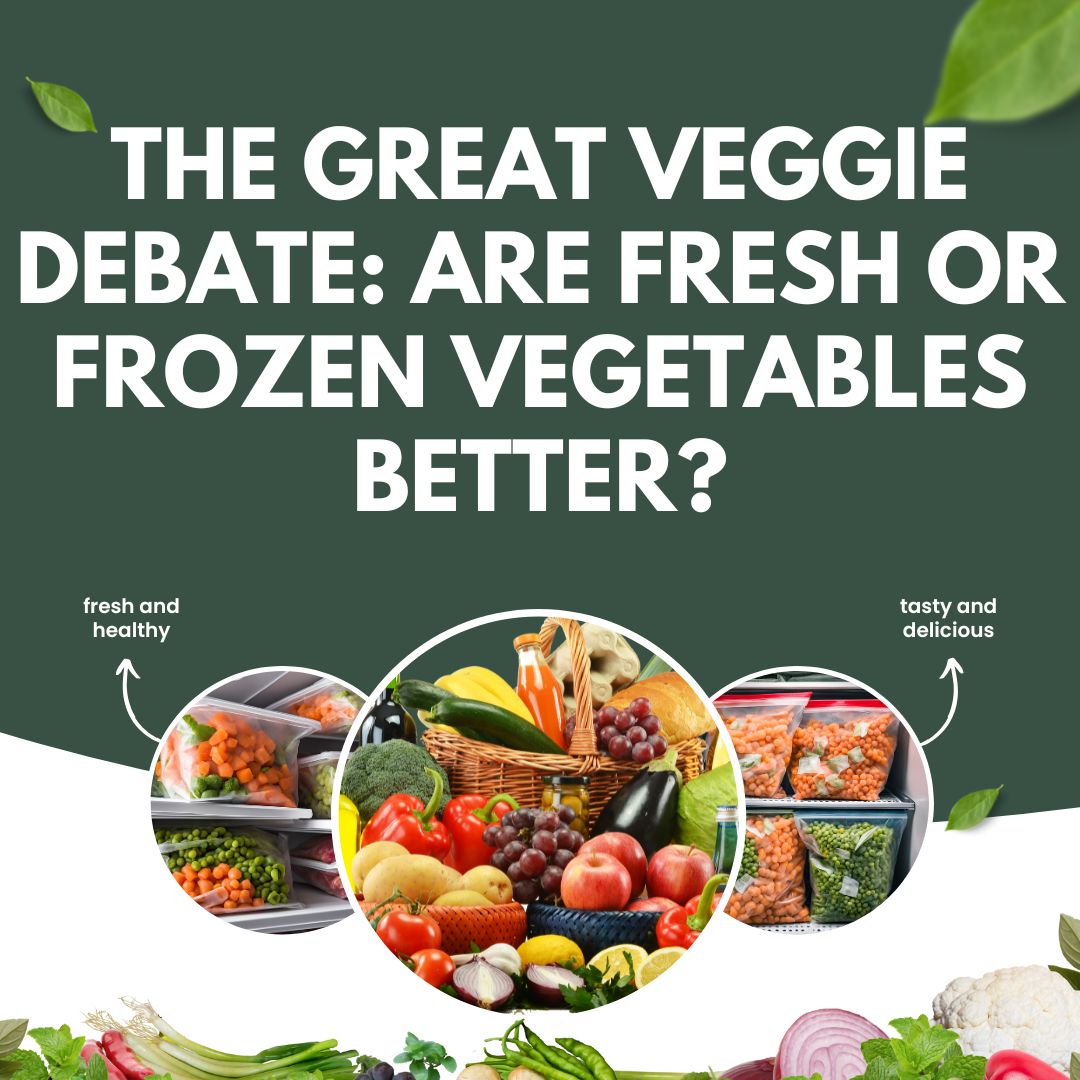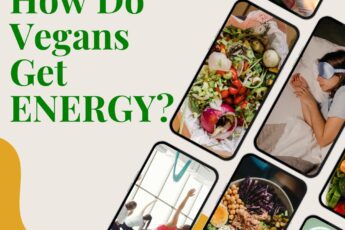As the vibrant colors of summer fade into the muted tones of fall and winter, a familiar question comes up for many of us: are fresh or frozen vegetables better?
Fresh produce can be harder to find this time of year, while frozen options offer convenience and long shelf life. But do frozen veggies still deliver the same nutrition and flavor? The answer isn’t one-size-fits-all. It depends on your goals, how you cook, and what’s most important to you – taste, nutrients, or sustainability.
Let’s take a closer look at how fresh and frozen vegetables compare so you can make the best choices for your plant-based meals.
Sorting It Out: Are Fresh or Frozen Vegetables Better for You?
The question “are fresh or frozen vegetables better?” comes up often because both have evolved over time. Fresh vegetables are traditionally seen as the healthier, more “natural” choice. But with today’s freezing technology, frozen vegetables are often picked at peak ripeness and frozen within hours.
That means they can hold on to nutrients and flavor surprisingly well. And when winter hits, frozen veggies can fill the gap when fresh options are limited or expensive. Understanding the real differences between fresh and frozen can help you make choices that fit your lifestyle and health goals.
The Benefits of Fresh Vegetables
Flavor and Texture
Fresh vegetables often stand out for their crispness, color, and bright flavor. A handful of fresh spinach, crunchy carrots, or a juicy tomato can make salads and sandwiches taste their best.
Nutritional Value
When vegetables are harvested at their peak and eaten quickly, they’re packed with vitamins and minerals. Leafy greens, peppers, and tomatoes are especially nutrient-rich when fresh. However, some of those nutrients start to fade the longer produce sits in storage or travels from farm to store.
Seasonal Variety
Choosing what’s in season brings variety and flavor to your meals. It also supports local farmers and helps you connect with the rhythm of seasonal eating, a simple way to enjoy fresher, tastier produce while supporting your community.
Fresh Vegetable Storage Tips
To make the most of your fresh produce, store greens in a dry container or loosely wrapped in paper towels to keep them crisp longer. Root vegetables last best in a cool, dark place, while herbs stay fresher if their stems are placed in a small jar of water in the fridge.
The Benefits of Frozen Vegetables
Convenience
Frozen vegetables come ready to cook – washed, chopped, and ready to use. They make quick dinners easier, reduce prep time, and help cut down on food waste.
Nutritional Preservation
Freezing methods have come a long way. Most frozen vegetables are blanched and flash-frozen right after harvest, which locks in nutrients. In many cases, frozen vegetables can be just as nutritious as fresh.
Quick Cooking Tip
Frozen veggies can go straight into the pan, oven, or even the microwave. For a fast side dish, microwave a bowl of frozen mixed vegetables with a splash of water for 2–3 minutes, then season and serve.
Cost-Effectiveness
Frozen produce is often more affordable, especially when certain vegetables are out of season. You can stock up on a variety without worrying about spoilage or rising prices.
When it comes to quick weeknight meals, frozen options often win. They make it easy to eat more vegetables even when life gets busy.
Are Fresh or Frozen Vegetables Better for Nutrition?
When it comes to nutrition, the answer depends on timing. Fresh vegetables harvested at peak ripeness and eaten soon after offer the highest vitamin and mineral content. Vitamin C, for example, is at its best in freshly picked bell peppers or leafy greens. But if those same vegetables sit in storage or are shipped long distances, nutrient levels can drop.
Frozen vegetables, on the other hand, are usually frozen within hours of picking. The process helps preserve fiber, minerals, and antioxidants. While some vitamins, like C and B, may decrease slightly during blanching, most nutrients remain stable during freezing.
Cooking Tips for Fresh and Frozen Vegetables
Cooking methods can make a big difference in taste and nutrition.
- Fresh vegetables do best with gentle cooking methods like steaming or roasting. Steaming helps retain vitamins, while roasting brings out a caramelized flavor.
- Frozen vegetables don’t need much time, they’re partially cooked before freezing. You can sauté them straight from the freezer, roast them without thawing, or microwave them for a quick side.
Avoid overcooking frozen veggies, as that can make them soft or watery. A quick cook over medium heat keeps their color, texture, and nutrients intact.
Vegetable Seasoning Tip
No matter which you choose, seasoning can transform a simple veggie into a standout side. A favorite all-purpose blend like Nature’s Seasons (an unsponsored pick) combines salt, pepper, and herbs in a way that makes any vegetable pop. Try it on steamed green beans, roasted carrots, or sautéed spinach, it works beautifully on both fresh and frozen veggies.
Fresh and Frozen Staples to Keep On Hand
Keeping both fresh and frozen vegetables in your kitchen helps you stay flexible and balanced. Variety is key to getting a full range of nutrients in a plant-based diet.
Fresh Vegetables
Leafy greens like spinach, kale, and arugula are vitamin powerhouses. Cruciferous veggies such as broccoli, cauliflower, and Brussels sprouts add fiber and antioxidants. Root vegetables – carrots, beets, and sweet potatoes, are hearty and satisfying. Don’t forget bell peppers, cucumbers, tomatoes, zucchini, and eggplant for extra flavor and color.
Frozen Vegetables
Stock up on frozen spinach, kale, peas, green beans, and mixed vegetables for easy meal additions. Single frozen options like broccoli florets, corn, or cauliflower are versatile staples. And for something different, try edamame or butternut squash – both are great sources of plant-based protein and nutrients.
Having both types on hand means you’ll always have vegetables ready, no matter what’s in season. Here are our favorite PLANT-BASED STAPLES to keep on hand.
Simple Meal Ideas with Fresh or Frozen Vegetables
Fresh Veggie Ideas:
- Toss crisp lettuce, cucumber, and cherry tomatoes with a light vinaigrette for a quick side salad.
- Roast a mix of bell peppers, zucchini, and red onion for colorful veggie tacos or grain bowls.
- Sauté kale or spinach with garlic and olive oil for a simple yet flavorful warm side.
Frozen Veggie Ideas
- Heat frozen mixed vegetables in the microwave and toss with cooked quinoa or rice for a five-minute meal.
- Add frozen broccoli, cauliflower, or peas to pasta dishes for extra nutrients and texture.
- Stir frozen corn and green beans into soups or stews for easy bulk and flavor.
Small additions like these make it easier to include vegetables in every meal without much planning or prep time.
The Environmental Impact of Fresh and Frozen Vegetables
The environmental side of the debate is often overlooked, but it’s important. Fresh vegetables can have a larger carbon footprint when they’re shipped long distances or stored for long periods.
Frozen vegetables can sometimes be the more sustainable choice. They reduce food waste thanks to their longer shelf life and can be produced locally, minimizing transport emissions. The freezing process does use energy, but it’s often less impactful than the fuel needed to ship fresh produce across the country.
By choosing locally grown fresh vegetables and regionally produced frozen options, you can enjoy both while keeping your footprint smaller.
So, Are Fresh or Frozen Vegetables Better?
The real answer is that both have their place. Fresh vegetables deliver unbeatable flavor and crunch, while frozen ones provide convenience and consistent nutrition. It all depends on what’s most important for your meals, budget, and routine.
So next time you’re at the store wondering are fresh or frozen vegetables better, remember – you don’t have to choose one over the other. Keep both in your kitchen and enjoy healthy, colorful meals all year long.
For more details, check out this evidence-based article from Healthline: FRESH vs FROZEN FRUIT AND VEGETABLES – WHICH ARE HEALTHIER?.






